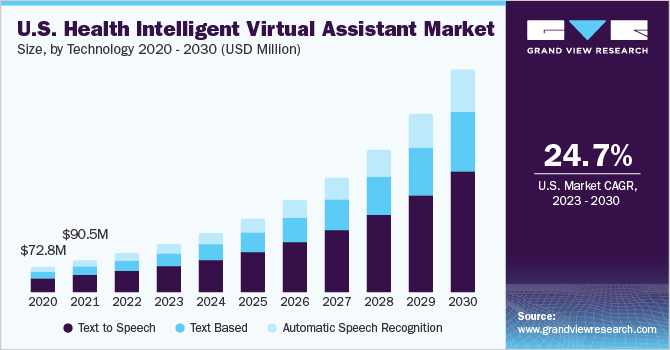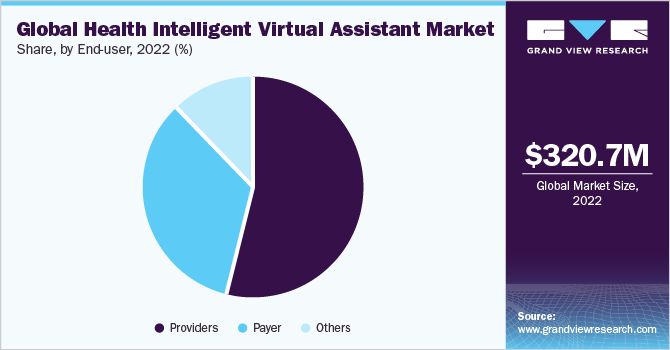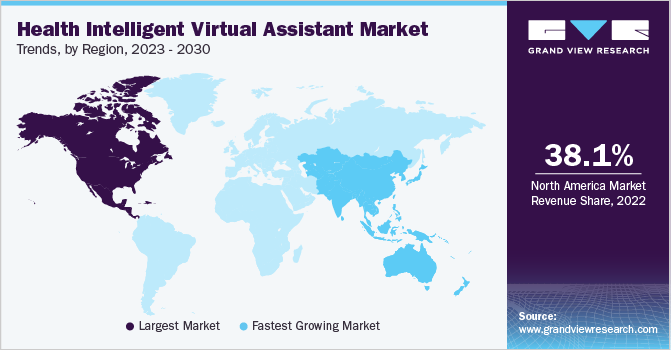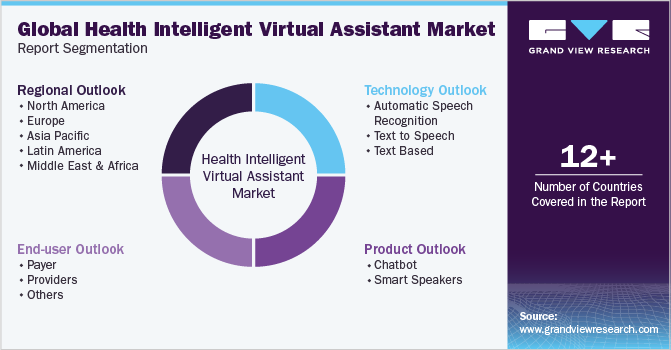- Home
- »
- Next Generation Technologies
- »
-
Health Intelligent Virtual Assistant Market Size Report, 2030GVR Report cover
![Health Intelligent Virtual Assistant Market Size, Share & Trends Report]()
Health Intelligent Virtual Assistant Market (2023 - 2030) Size, Share & Trends Analysis Report By Product (Chatbot, Smart Speakers), By Technology, By End-user (Payer, Providers, Others), By Region, And Segment Forecasts
- Report ID: GVR-2-68038-619-6
- Number of Report Pages: 180
- Format: PDF
- Historical Range: 2017 - 2021
- Forecast Period: 2023 - 2030
- Industry: Technology
- Report Summary
- Table of Contents
- Segmentation
- Methodology
- Download FREE Sample
-
Download Sample Report
Health Intelligent Virtual Assistant Market Size & Trends
The global health intelligent virtual assistant market size was valued at USD 320.7 million in 2022 and is expected to expand at a compound annual growth rate (CAGR) of 24.7% from 2023 to 2030. Medical virtual assistants (MVA) help in patient engagement and provide virtual coaching to help patients in the most critical moments. Increasing adoption of AI in healthcare applications and a growing emphasis on patient engagement activities are anticipated to propel the market.

Several organizations are reconsidering their user experience strategy and implementing patient engagement solutions to increase revenue and improve patient satisfaction. It is expected to boost the growth of the global market.
Also, healthcare organizations are improving patient service functions, such as medication reminders and other personalized services, by leveraging virtual assistant solutions. Artificial intelligence in virtual assistants helps minimize the number of people getting affected due to rapid outbreaks of diseases, such as Ebola and the Swine Flu.
These medical assistants can suggest preventive measures for common infections like malaria, HIV, and tuberculosis. Thus, with technological advancements, the significance of AI-driven MVAs has increased. Modern technologies, specifically automation and Automatic Speech Recognition (ASR) are increasingly being adopted in the healthcare sector.
Moreover, advancements in products and services are poised to gain momentum owing to the expansion of digital transformation work. With increasing proof of concept studies taken within various areas in the healthcare sector and higher adoption of virtual assistants, the demand for ASR technology is likely to grow over the forecast period.
However, increasing the adoption of intelligent virtual assistants in the healthcare industry encourages market participants to operate across the value chain to invest in developing advanced solutions that result in market growth. For instance, in September 2017, Nuance Communications, Inc. launched an AI-powered Dragon Medical Virtual Assistant to streamline various clinical workflows. The new solution helps improve the patient experience by enhancing interactions between clinicians and patients.
Product Insights
Based on the product, the global health intelligent virtual assistant market is segmented into chatbots and smart speakers. The chatbot segment captured the largest revenue share of over 73.8% in 2022. Chatbots have a high demand in the healthcare industry as they assist physicians, nurses, and patients at various levels with the help of text/speech/audio. Safedrugbot, Izzy, Babylon Health, Florence, Sensely, and Buoy Health are some of the popular bots used in various hospitals across the globe.
The smart speakers segment is estimated to register the fastest CAGR of 25.4% over the forecast period. They use automated speech recognition technology, which is most widely used for medical counseling or as a therapist for patients suffering from loneliness and depression. These speakers automatically recognize speech and perform a set of actions accordingly.
Technology Insights
Based on technology, the market is segmented into automatic speech recognition, text to speech, and text based. The text to speech segment accounted for the largest revenue share of 54.2% in 2022. It allows computers to interpret human speech, convert audio or voice, and transcribe it to written text to understand the content quickly. Technological developments in neuro-linguistic programming, conversation interface, automation, AI, and deep and machine learning processes have made virtual assistants useful. Leading firms like Amazon.com, Inc., Apple Inc., and Google LLC use these technologies as virtual assistants. Products these companies offer are intermediaries between customers, enterprise, and their services.
The automatic speech recognition segment is estimated to register the fastest CAGR of 26.0% over the forecast period. It is used to identify words or alphabets and to validate a person's identity. The high adoption of smart speakers and chatbots for medical counseling by various therapists for patient engagement contributes to the segment's growth.
End-user Insights
Based on end-user, the market is segmented into payers, providers, and others. The providers segment accounted for the largest revenue share of around 54.2% in 2022 and is expected to grow at the fastest CAGR of 25.1%. They help with various services such as scheduling and confirming appointments, providing appointment reminders, following up with patients, and providing a medical diagnosis with physicians. The increasing adoption of electronic health records (EHRs) and the need for seamless integration of healthcare systems have driven the demand for health intelligent virtual assistants (IVAs) in the provider segment. IVAs can integrate with existing EHR systems and retrieve patient information, enabling healthcare providers to access relevant data quickly and make informed decisions during patient consultations.

The others segment is estimated to grow significantly at a CAGR of 24.5% over the forecast period. They provide services such as following up on claims, handling appeals, ordering needed supplies, and doing any other duties as required, including accounting and payroll.
Payers offer services and enhance interoperability by keeping patient records and protecting them. They perform several functions: plan selection, billing and collections, wellness assessments, and enrollment guidance. As a result, the payer segment is poised to post a noteworthy CAGR over the forecast period. As a result, the payer's segment is poised to grow over the forecast period.
Regional Insights
North America dominated the market and accounted for the largest revenue share of 38.1% in 2022, owing to the high adoption of IoT and the wide usage of smartphones. The shortfall of clinicians/physicians and the requirement for an aggressive healthcare facility due to the rising population in countries such as the U.S. is anticipated to drive the regional market.

Asia Pacific is expected to register the highest CAGR of 26.2% over the forecast period. Countries such as China and India are actively taking measures to implement health intelligent virtual assistants in the healthcare industry. The increasing population and a shortage of skilled physicians and therapists fuel the demand for virtual assistants in the region.
Key Companies & Market Share Insights
The market is highly competitive, and the players are undertaking strategies such as forecast launches, acquisitions, and collaborations to increase their global reach. For instance, in January 2023, Orbita, Inc. launched Orbita Blaze, aiming to transform provider websites and enhance the user experience. Using conversational AI, Blaze engages in interactive conversations with patients, gathering relevant information to understand their needs and preferences. It guides patients to the most suitable healthcare provider and facility with this valuable insight. By converting the entire website into an intuitive virtual assistant, Blaze eliminates obstacles to accessing care and significantly improves navigation, ultimately enhancing patient access and overall satisfaction. The following are some of the major participants in the global health intelligent virtual assistant market:
-
CSS Corp
-
CodeBaby, Inc
-
eGain Corporation
-
Kognito
-
Microsoft
-
MEDRESPOND
-
Next IT Solutions.
-
Nuance Communications, Inc.
-
True Image Interactive, Inc.
-
Virgin Pulse
Recent Developments
-
In April 2023, EVA.ai launched its AI Virtual Assistant, EVA Bot. This advanced virtual assistant utilizes a state-of-the-art Large Language Model (LLM) with an impressive 6 billion parameters, enabling it to deliver exceptional, intelligent communication abilities for large organizations, including prestigious institutions like the United Nations. EVA Bot's primary objective is to transform the recruitment and talent management industry by offering extensive personalization options and advanced question-answering capabilities.
-
In March 2023, Royal Philips, a subsidiary of Koninklijke Philips N.V., launched Philips Virtual Care Management, a comprehensive range of adaptable solutions and services to assist health providers, systems, employers, and payers groups, to establish more meaningful connections with patients regardless of their location. This innovative offering from Philips reduces the burden on hospital staff by minimizing visits to the emergency department and effectively managing chronic diseases, ultimately leading to decreased healthcare costs.
-
In November 2022, East and North Hertfordshire (NHS) Trust launched Enquire, an intelligent virtual assistant driven by IBM Watson Assistant on IBM Cloud. This initiative aims to assist the trust's HR team in managing inquiries from its 6,500 staff members. Enquire has been designed for the NHS Trust to reduce the administrative burden on HR employees, allowing them to focus on more complex and valuable tasks.
-
In October 2022, AtlantiCare collaborated with Orbita, Inc., a virtual assistant and conversational AI solutions provider. The healthcare organization has successfully implemented Orbita's virtual assistant and AI platform, which enables seamless communication between individuals and their healthcare providers. By utilizing this technology, AtlantiCare aims to enhance patient access to self-scheduling options while ensuring a user-friendly experience.
-
In April 2022, Real Chemistry acquired ConversationHealth.com. The acquisition of ConversationHealth.com allows Real Chemistry to incorporate top-notch conversational AI technologies and medical expertise into its services. This enables Real Chemistry's clients to deliver medical interactions on a large scale, utilizing various mediums, such as text, voice, and digital humans, across different markets and languages.
Health Intelligent Virtual Assistant Market Report Scope
Report Attribute
Details
Market size value in 2023
USD 398.7 million
Revenue forecast in 2030
USD 1,874.2 million
Growth rate
CAGR of 24.7% from 2023 to 2030
Base year for estimation
2022
Historical data
2017 - 2021
Forecast period
2023 - 2030
Report updated
October 2023
Quantitative units
Revenue in USD million/billion and CAGR from 2023 to 2030
Report coverage
Revenue forecast, company ranking, competitive landscape, growth factors, and trends
Segments covered
Product, technology, end-user, region
Regional scope
North America; Europe; Asia Pacific; Latin America; and MEA
Country scope
U.S.; Canada; U.K.; Germany; France; China; India; Japan; South Korea; Australia; Brazil; Mexico; United Arab Emirates; Saudi Arabia; South Africa
Key companies profiled
CSS Corp; CodeBaby; Inc; eGain Corporation; Kognito; Microsoft; MEDRESPOND; Next IT Solutions; Nuance Communications; Inc.; True Image Interactive; Inc.; Virgin Pulse
Customization scope
Free report customization (equivalent up to 8 analyst’s working days) with purchase. Addition or alteration to country, regional & segment scope
Pricing and purchase options
Avail customized purchase options to meet your exact research needs. Explore purchase options
Global Health Intelligent Virtual Assistant Market Report Segmentation
This report forecasts revenue growth at global, regional, and country levels and provides an analysis of the latest industry trends in each of the sub-segments from 2017 to 2030. For this study, Grand View Research has segmented the global health intelligent virtual assistant market based on product, technology, end-user, and region:

-
Product Outlook (Revenue in USD Million, 2017 - 2030)
-
Chatbot
-
Smart Speakers
-
-
Technology Outlook (Revenue in USD Million, 2017 - 2030)
-
Automatic Speech Recognition
-
Text to Speech
-
Text Based
-
-
End-user Outlook (Revenue in USD Million, 2017 - 2030)
-
Payer
-
Providers
-
Others
-
-
Regional Outlook (Revenue in USD Million, 2017 - 2030)
-
North America
-
U.S.
-
Canada
-
-
Europe
-
UK
-
Germany
-
France
-
-
Asia Pacific
-
China
-
Japan
-
India
-
Australia
-
South Korea
-
-
Latin America
-
Brazil
-
Mexico
-
-
Middle East and Africa
-
United Arab Emirates (UAE)
-
Saudi Arabia
-
South Africa
-
-
Frequently Asked Questions About This Report
b. The global health intelligent virtual assistant market size was estimated at USD 320.7 million in 2022 and is expected to reach USD 398.7 million in 2023.
b. The global health intelligent virtual assistant market is expected to grow at a compound annual growth rate of 24.7% from 2023 to 2030 to reach USD 1,874.20 million by 2030.
b. Chatbot segment dominated the health intelligent virtual assistant market with a share of 73% in 2022. This is attributable to high demand in the healthcare industry as chatbots assist physicians, nurses, and patients at various levels with the help of text/speech/audio.
b. Some key players operating in the health intelligent virtual assistant market include CSS Corp, CodeBaby, Inc, eGain Corporation, Kognito, Microsoft, MEDRESPOND, Next IT Solutions, Nuance Communications, Inc., True Image Interactive, Inc., Virgin Pulse.
b. Key factors that are driving the market growth include increasing adoption of AI in healthcare applications and a growing emphasis on patient engagement activities.
Share this report with your colleague or friend.
Need a Tailored Report?
Customize this report to your needs — add regions, segments, or data points, with 20% free customization.

ISO 9001:2015 & 27001:2022 Certified
We are GDPR and CCPA compliant! Your transaction & personal information is safe and secure. For more details, please read our privacy policy.
Trusted market insights - try a free sample
See how our reports are structured and why industry leaders rely on Grand View Research. Get a free sample or ask us to tailor this report to your needs.










